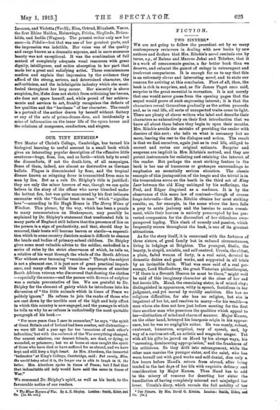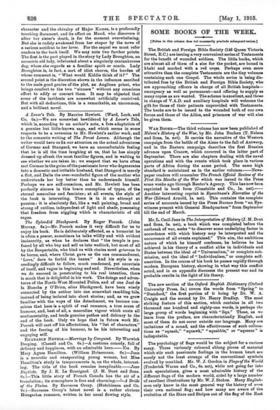FICTION.
TWO SINNERS!
WE are not going to follow the precedent set by so many contemporary reviewers in dealing with new books by new authors and declare that Mrs. Ritchie's novel reminds one by turns, e.g., of Balzao and Meares Jokai and Tohekor-, that it is a work of consummate genius, a far better book than we deserve, and exhaust the gamut of eulogy in extravagant and irrelevant comparisons. It is enough for us to say that this is an extremely clever and interesting novel, and to state our reasons for arriving at this conclusion. First of all, then, the book is rich in surprises, and, as Sir James Paget once said, surprise is the great essential in recreation. It is not merely that one would never guess from the opening pages that the sequel would prove of such engrossing interest; it is that the characters reveal themselves gradually as the action proceeds and, as in real life, all sorts of unexpected traits come to light. There are plenty of clever writers who label and describe their characters so exhaustively on their first introduction that we know all about them before they begin to open their months. Mre. Ritchie avoids the mistake of providing the reader with dossiers of this sort ; she tells us what is necessary but no more, leaving the rest to the dialogue and action. The result is that we find ourselves, again just as in real life, obliged to correct and revise our original estimate. Surprise and suspense are implicit in Mre. Ritehie'a method, and they are Potent instruments for enlisting and retaining the interest of the reader. But perhaps the most striking feature in the book is her use of humorous or grotesque surroundings to emphasize an essentially serious situation. The classic example of this juxtaposition of the tragic and the trivial is in the tremendous scene on the heath in the third act of King Lear between the old King unhinged by his sufferings, the Fool, and Edgar disguised ae a madman. It is by the observance of this same law of contrast—though of course lenge intervallo—that Mre. Ritchie obtains her most striking results; as, for example, in the scene where the hero falls a prey to acute jealousy and the heroine to acute resent- ment, while their hostess is entirely preoccupied by her per- verted compassion for the discomfort of her ridiculous over- pampered lapdog. This clash of comedy and passion, which frequently recurs throughout the book, is one of its greatest attractions.
AB for the story itself, it is concerned with the fortunes of three sisters, of good family but in reduced circumstances, living in lodgings at Brighton. The youngest, Stella, the beauty, is stupid, amiable, and self-centred. Ursula, the eldest, a plain, faded woman of forty, is a real saint, devoted to domestic duties and good works, and supported in all trials by an invincible faith. What was once said of a real per- sonage, Lord Shaftesbury, the great Victorian philanthropist, "If there is a Seventh Heaven he must be there," might well be said of this imaginary character at the close of her sad but heroic life. Maud, the remaining sister, is of mixed clay; distinguished in appearance, witty in speech, fastidious in her judgment, and yet moved by worldly ambition. She has no religions difficulties, for she has no religion, but she is impatient of her lot, and resolves to marry—for his wealth—a man whom she does not love just before meeting for the first time another man who possesses the qualities which appeal to her—distinction of mind and charm of manner. Major Karnes, on the other hand, betrayed his bourgeois origin in his appear- ance, but he was no negligible suitor. He was manly, robust, exuberant, humorous, sceptical, racy of speech, and, by way of a curious set-off, an artistic and magnetic singer. Yet with all his gifts he jarred on Maud by his abrupt ways, his "caressing, domineering appropriation," and the frankness of his criticisms. So they drift into estrangement, while the other man marries the younger sister, and the saint, who has worn herself out with good works and self-denial, dies only a few hours before Mand's return from abroad, after being tended in the last days of her life with exquisite delicacy and consideration by Major Kamm. Thus Maud has to add to the misery of remorse for deserting her sister the humiliation of having completely misread and misjudged her lover. Ureala's diary, which reveals the full nobility of her
•
co. Two Stiners. By Mn. David 0. London: Smith, sad [en] character and the chivalry of Major Karnes, is a profoundly touching document, and its effect on Maud, who discovers it after her sister's death, is for the moment overwhelming. But she is rudely awakened from her stupor by the news of a serious accident to her lover. For the sequel we must refer readers to the book itself. We may note two further points. The first is the part played in the story by Lady Broughton, an eccentric old lady, infatuated about a singularly cantankerous dog, whom she regards as a familiar spirit or oracle. Lady Broughton is, in fact, a sort of idiot chorus, the burden of whose comment is, " What would Kiddie think of it?" The second point is the discretion shown in the influence ascribed to the male good genius of the plot, an Anglican priest, who brings comfort to the two " sinners " without any conscious effort to edify or convert them. It may be objected that some of the incidents are somewhat artificially contrived. But with all deductions, this is a remarkable, an uncommon, and a brilliant novel.



































 Previous page
Previous page